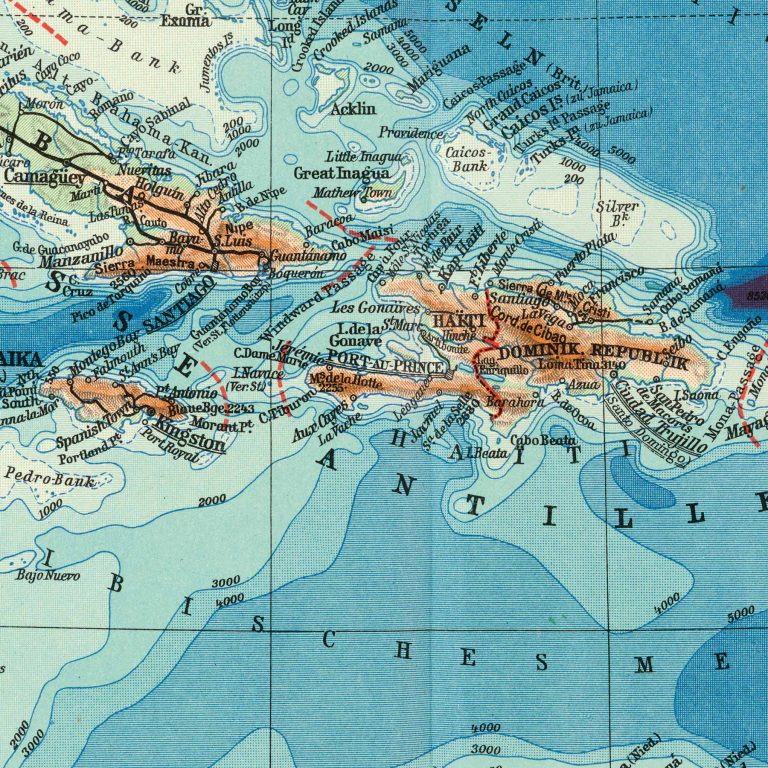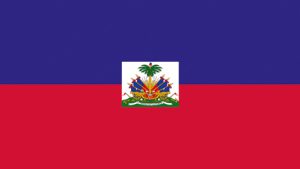
Haiti
Policy on Immigration and Refugees
Haiti, the western part of the island of Hispaniola, is initially colonized by Spain. It then passes into French control, and its sugarcane production makes it France’s wealthiest colony. Ninety percent of its inhabitants are slaves who have been abducted from Africa at various times.
Uprisings by the middle-class and later the black slaves – inspired by the French Revolution – make Haiti the first country in Latin America to gain its independence, on January 1, 1804. In 1825, the former colonial power, France, expresses its willingness to resume trade relations, which are necessary for Haiti’s economy, but only if Haiti pays 150 million gold francs in “compensation.”
In 1838 the sum is reduced to 60 million, but this debt cripples Haiti’s economic development well into the middle of the 20th century and is a crucial cause of the country’s extreme poverty and political instability.
Following decades of violent internal power struggles, the US deploys marines to Haiti in 1915. They are supposed to stabilize the country politically and economically, but also prevent the German Empire from establishing a naval base in the Caribbean. Sténio Vincent, the former mayor of the capital city of Port-au-Prince, makes a name for himself through criticism of American occupation and paternalism, and in 1930 is elected the 28th president of Haiti.
Under President Vincent, Haiti’s immigration policies are relatively liberal. Beginning in 1937, Haitian diplomats issue several hundred entry visas for Jewish refugees from Germany. In 1938, the Haitian foreign minister offers to take in 50,000 Jewish refugees. However, this offer is rescinded in January 1939, following intervention by the US Department of State, which fears that the refugees will travel onward from Haiti to the US.
In May 1939, President Sténio Vincent decrees that naturalization in absentia is to be permitted at Haiti’s consulates. This is, however, contingent on proving an amount of capital to be invested in Haitian agriculture and industry – the necessary sum grows ever larger. This too means that only a comparatively small number of Jewish refugees find permanent sanctuary in the Caribbean country. For most refugees from Europe, Haiti serves only as a transit country on their way to the US.
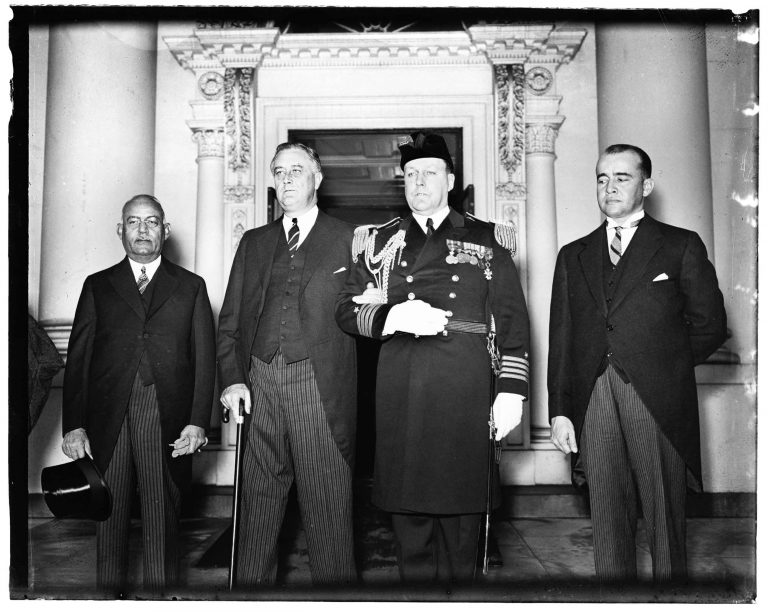
Haitian President Vincent (l.) and US President Roosevelt (2nd from l.), who is supported by his naval attaché Captain Walter N. Vernou, outside the White House, 1934
As part of the Roosevelt administration’s “Good Neighbor Policy,” US naval troops are withdrawn from Haiti in 1934. That same year, President Sténio Vincent is received by President Roosevelt at the White House.
Harris & Ewing / Library of Congress, Prints & Photographs Division, LC-DIG-hec-47010
Haitian President Vincent (l.) and US President Roosevelt (2nd from l.), who is supported by his naval attaché Captain Walter N. Vernou, outside the White House, 1934
As part of the Roosevelt administration’s “Good Neighbor Policy,” US naval troops are withdrawn from Haiti in 1934. That same year, President Sténio Vincent is received by President Roosevelt at the White House.
Harris & Ewing / Library of Congress, Prints & Photographs Division, LC-DIG-hec-47010
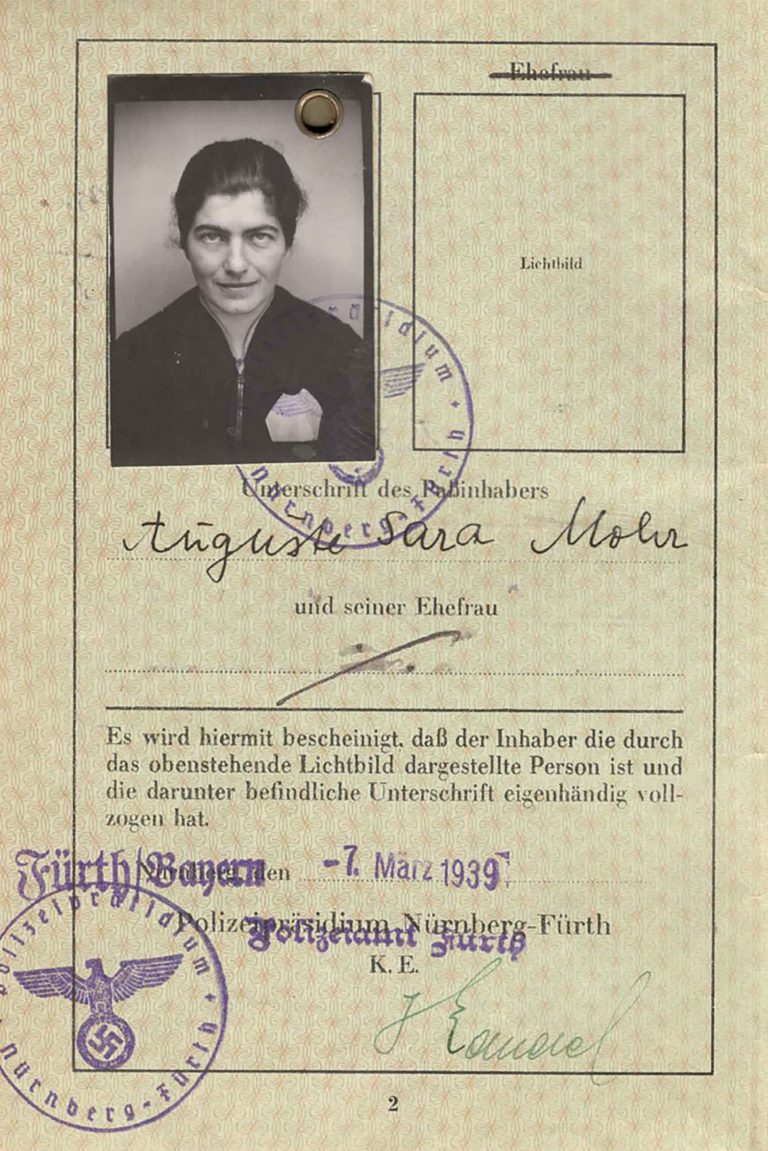
Nürnberg-Fürth police headquarters: passport for Auguste Mohr, March 7, 1939
Auguste Mohr’s passport, which already bears the compulsory Jewish name “Sara” and is stamped with the letter “J,” holds an entry visa from the Haitian consulate in Hamburg, dated March 9, 1939, and is valid for one year. With the confirmation of this visa, Auguste Mohr attains the release of her husband Ernst, who has been imprisoned in the Dachau concentration camp since the November pogrom in 1938, and is able to immigrate to Haiti with him and their two small children.
Private collection Harriet und Bill Mohr, Menlo Park, CA
Nürnberg-Fürth police headquarters: passport for Auguste Mohr, March 7, 1939
Auguste Mohr’s passport, which already bears the compulsory Jewish name “Sara” and is stamped with the letter “J,” holds an entry visa from the Haitian consulate in Hamburg, dated March 9, 1939, and is valid for one year. With the confirmation of this visa, Auguste Mohr attains the release of her husband Ernst, who has been imprisoned in the Dachau concentration camp since the November pogrom in 1938, and is able to immigrate to Haiti with him and their two small children.
Private collection Harriet und Bill Mohr, Menlo Park, CA
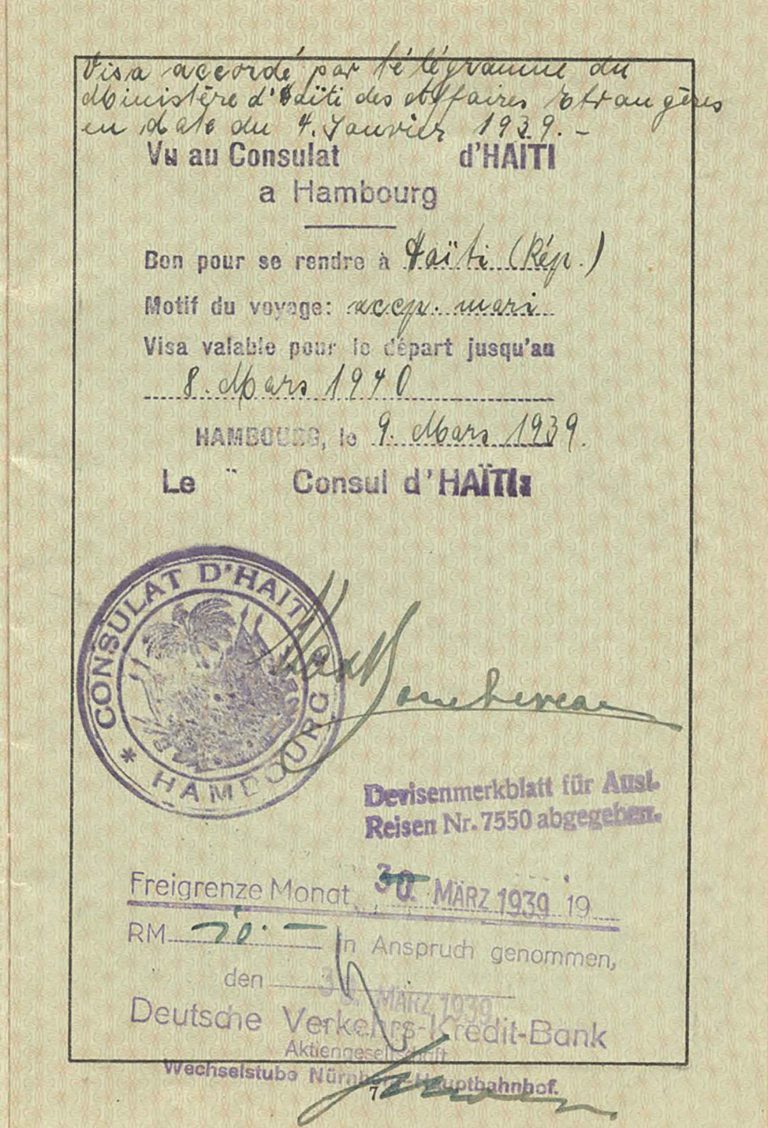
Nürnberg-Fürth police headquarters: passport for Auguste Mohr with Haitian entry visa, March 7, 1939
Auguste Mohr’s passport, which already bears the compulsory Jewish name “Sara” and is stamped with the letter “J,” holds an entry visa from the Haitian consulate in Hamburg, dated March 9, 1939, and is valid for one year. With the confirmation of this visa, Auguste Mohr attains the release of her husband Ernst, who has been imprisoned in the Dachau concentration camp since the November pogrom in 1938, and is able to immigrate to Haiti with him and their two small children.
Private collection Harriet und Bill Mohr, Menlo Park, CA
Nürnberg-Fürth police headquarters: passport for Auguste Mohr with Haitian entry visa, March 7, 1939
Auguste Mohr’s passport, which already bears the compulsory Jewish name “Sara” and is stamped with the letter “J,” holds an entry visa from the Haitian consulate in Hamburg, dated March 9, 1939, and is valid for one year. With the confirmation of this visa, Auguste Mohr attains the release of her husband Ernst, who has been imprisoned in the Dachau concentration camp since the November pogrom in 1938, and is able to immigrate to Haiti with him and their two small children.
Private collection Harriet und Bill Mohr, Menlo Park, CA
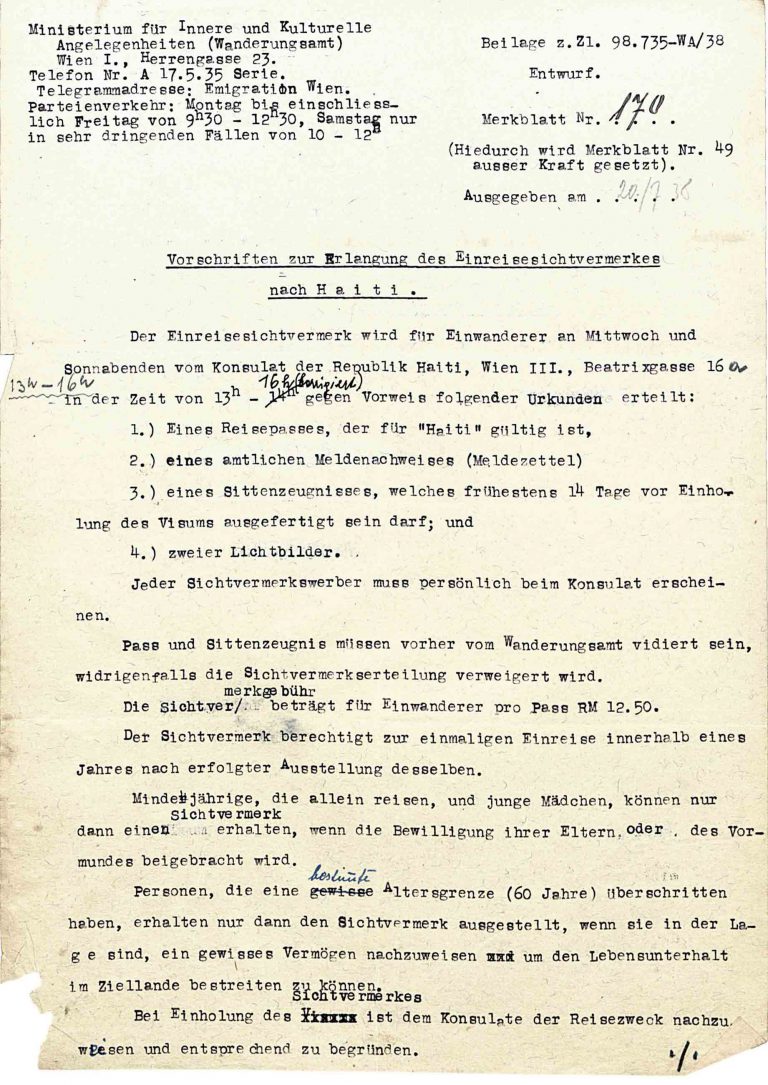
Vienna Migration Office: Requirements for obtaining an entry visa for Haiti, July 20, 1938, p. 1
As early as summer 1938, those willing to immigrate to Haiti must pay 100 US$ to land in the country and demonstrate that they are bringing a larger amount of capital with them. Later, the amount of money that must be paid or proven increases many times over. Immigration by “Asians, Orientals and stateless persons” is completely forbidden.
Österreichisches Staatsarchiv, Wien
Vienna Migration Office: Requirements for obtaining an entry visa for Haiti, July 20, 1938, p. 1
As early as summer 1938, those willing to immigrate to Haiti must pay 100 US$ to land in the country and demonstrate that they are bringing a larger amount of capital with them. Later, the amount of money that must be paid or proven increases many times over. Immigration by “Asians, Orientals and stateless persons” is completely forbidden.
Österreichisches Staatsarchiv, Wien
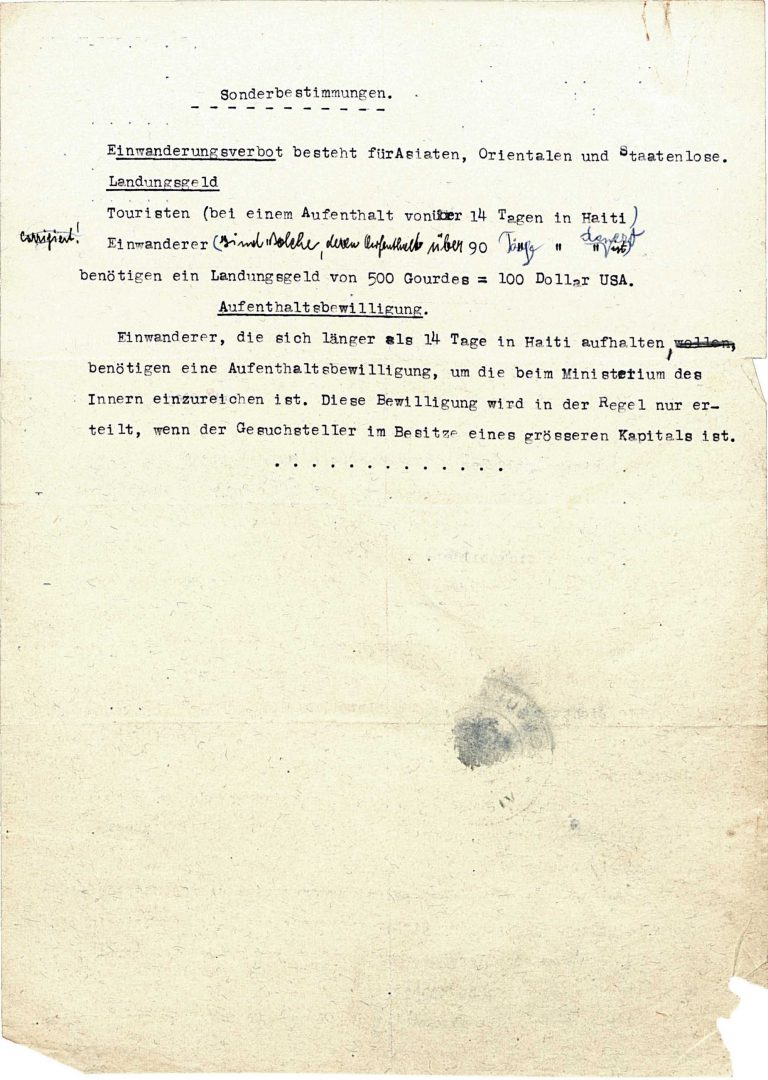
Vienna Migration Office: Requirements for obtaining an entry visa for Haiti, July 20, 1938, p. 2
As early as summer 1938, those willing to immigrate to Haiti must pay 100 US$ to land in the country and demonstrate that they are bringing a larger amount of capital with them. Later, the amount of money that must be paid or proven increases many times over. Immigration by “Asians, Orientals and stateless persons” is completely forbidden.
Österreichisches Staatsarchiv, Wien
Vienna Migration Office: Requirements for obtaining an entry visa for Haiti, July 20, 1938, p. 2
As early as summer 1938, those willing to immigrate to Haiti must pay 100 US$ to land in the country and demonstrate that they are bringing a larger amount of capital with them. Later, the amount of money that must be paid or proven increases many times over. Immigration by “Asians, Orientals and stateless persons” is completely forbidden.
Österreichisches Staatsarchiv, Wien
Delegation
Léon Robert Thébaud
* 5 June 1894 Gonaïves /Haiti † unknown
Georges Auguste Léon Robert Thébaud is born into a French aristocratic family originally from Brittany. He resides in northern Haiti, where he receives a conservative Catholic upbringing, completes his training at his father’s import trading company, and then pursues a career in the diplomatic service.
In 1927 he becomes the consul general of the Republic of Haiti in Marseille, and beginning in 1932 he serves as a legation councilor at the embassy in Paris. In 1937, the Foreign Ministry appoints him minister plenipotentiary of Haiti in France. After four years there, Thébaud is transferred in 1941 to Rome, where he represents Haiti as an envoy extraordinary to the Vatican.
The occupation of Rome by the German armed forces in September 1943 forces him to step down from this post. He returns to Rome in 1947, and in 1954 once again becomes Haiti’s minister plenipotentiary in France, where he has a monument to Haitian revolutionary hero François-Dominique Toussaint Louverture erected.
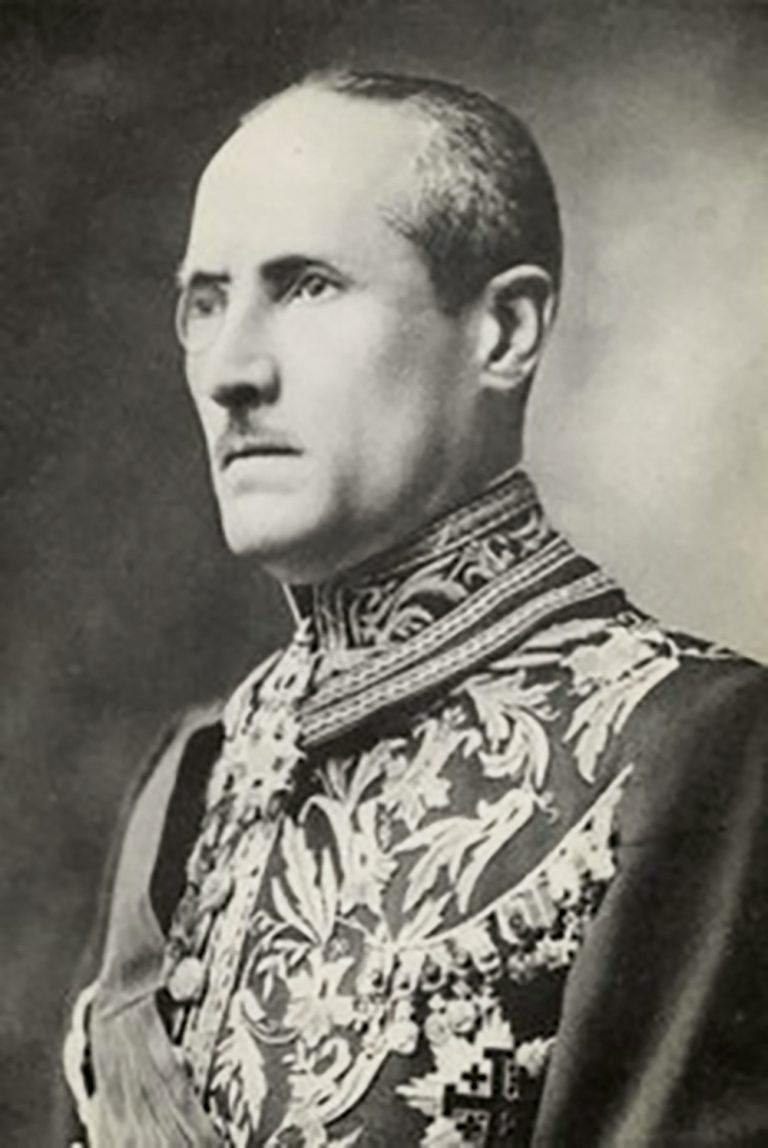
Léon Robert Thébaud as a minister plenipotentiary in France, ca. 1940
Grasset Baron Surcouf, Léon Robert Thébaud: un diplomate Haïtien ami de la France, Paris 1949
Léon Robert Thébaud as a minister plenipotentiary in France, ca. 1940
Grasset Baron Surcouf, Léon Robert Thébaud: un diplomate Haïtien ami de la France, Paris 1949
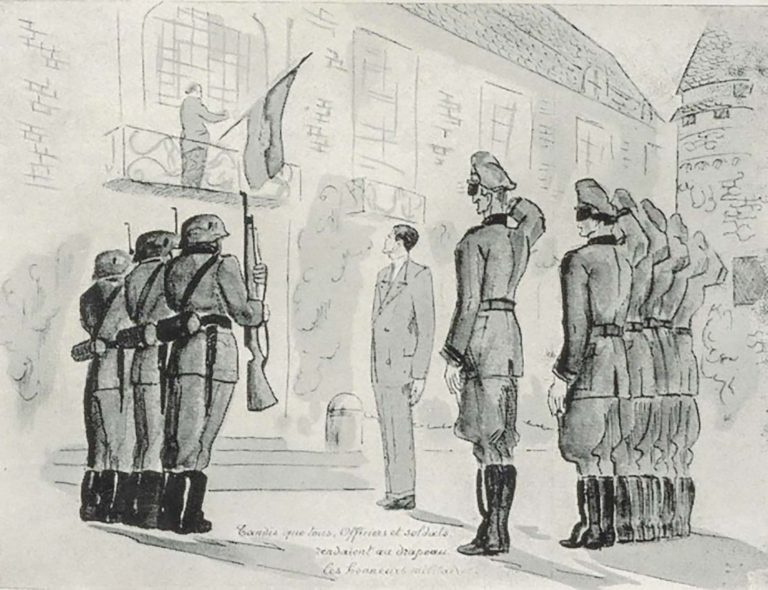
German military officers salute the flag of the first black republic, drawing by Noel Thébaud, ca. 1940
In June 1940, German soldiers briefly seize the Thébaud family’s country estate in Bailleul-Sur-Thérain in northern France and remove the flag of the Republic of Haiti from its balcony. Following Léon Robert Thébaud’s intervention with the German field command, the flag is restored to its place with military honors.
Grasset Baron Surcouf, Léon Robert Thébaud: un diplomate Haïtien ami de la France, Paris 1949
German military officers salute the flag of the first black republic, drawing by Noel Thébaud, ca. 1940
In June 1940, German soldiers briefly seize the Thébaud family’s country estate in Bailleul-Sur-Thérain in northern France and remove the flag of the Republic of Haiti from its balcony. Following Léon Robert Thébaud’s intervention with the German field command, the flag is restored to its place with military honors.
Grasset Baron Surcouf, Léon Robert Thébaud: un diplomate Haïtien ami de la France, Paris 1949
Conference Contributions
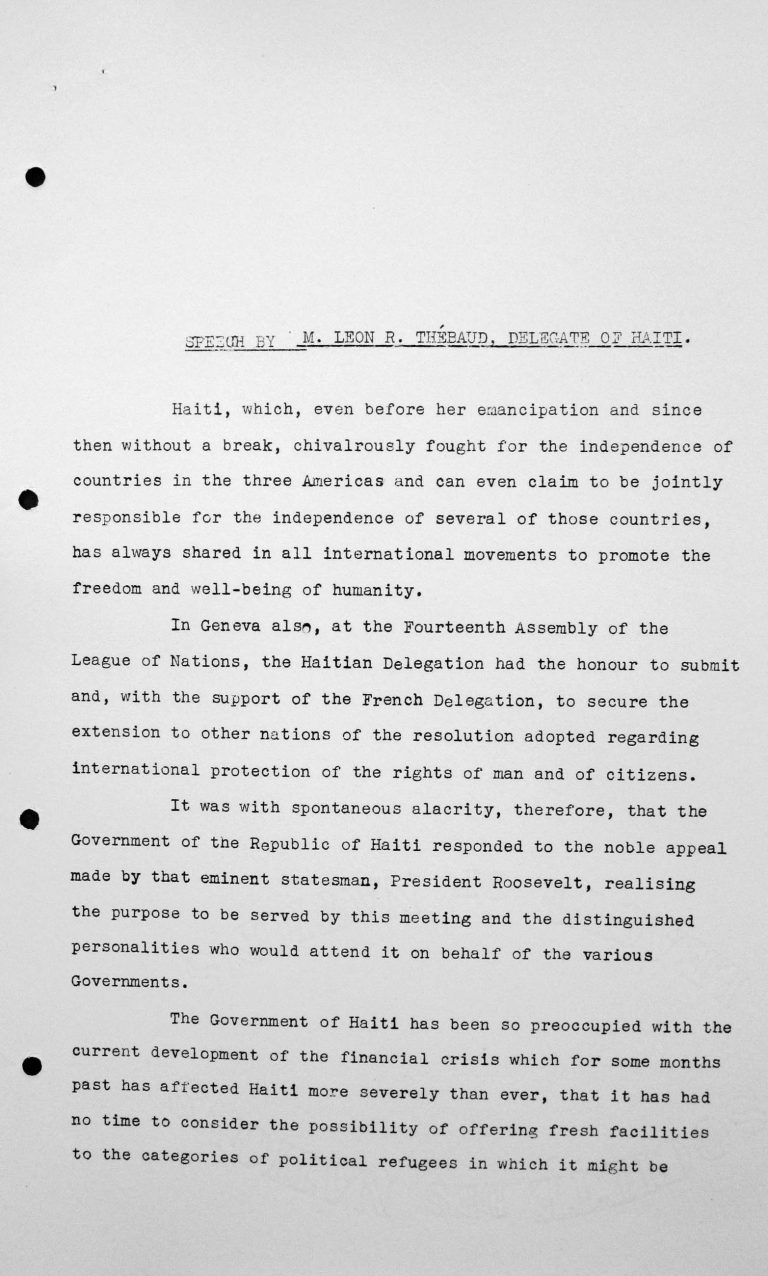
Speech by Léon R. Thébaud (Haiti) in the public session on July 11, 1938, 11am, p. 1/3
Franklin D. Roosevelt Library, Hyde Park, NY
Speech by Léon R. Thébaud (Haiti) in the public session on July 11, 1938, 11am, p. 1/3
Franklin D. Roosevelt Library, Hyde Park, NY
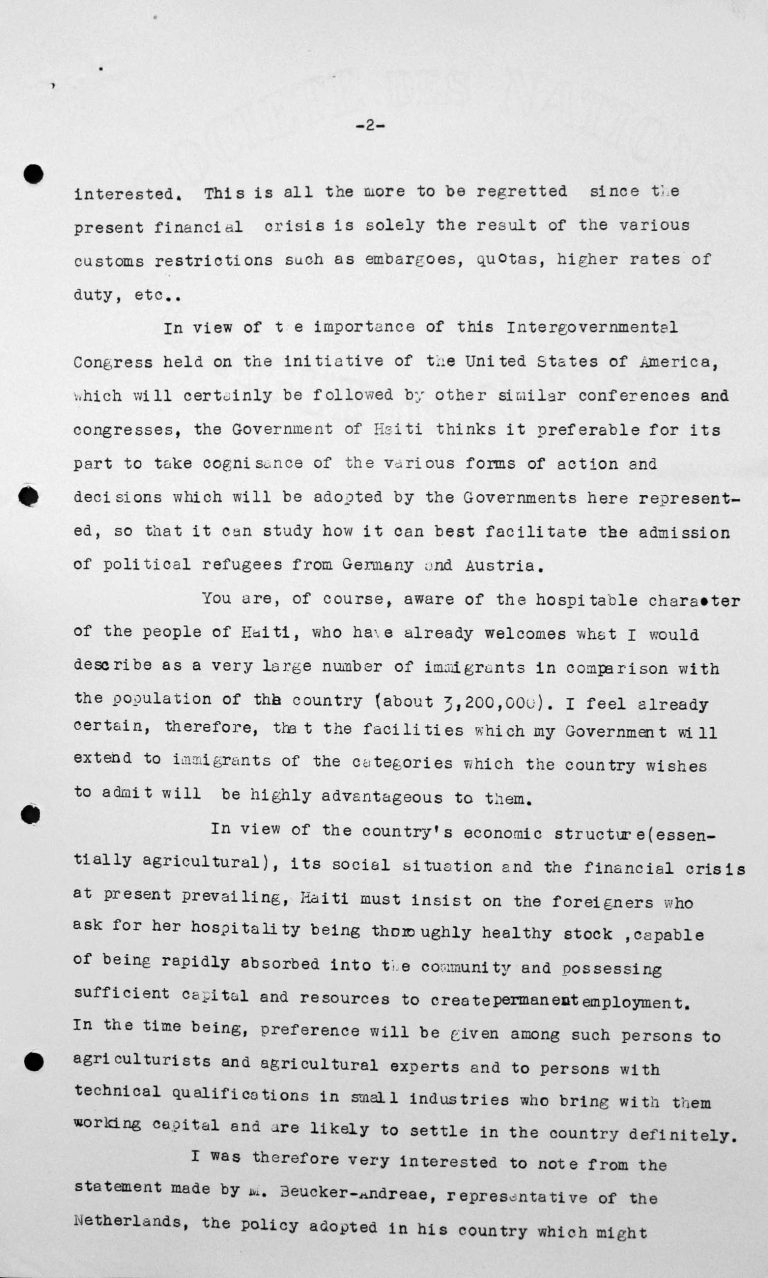
Speech by Léon R. Thébaud (Haiti) in the public session on July 11, 1938, 11am, p. 2/3
Franklin D. Roosevelt Library, Hyde Park, NY
Speech by Léon R. Thébaud (Haiti) in the public session on July 11, 1938, 11am, p. 2/3
Franklin D. Roosevelt Library, Hyde Park, NY
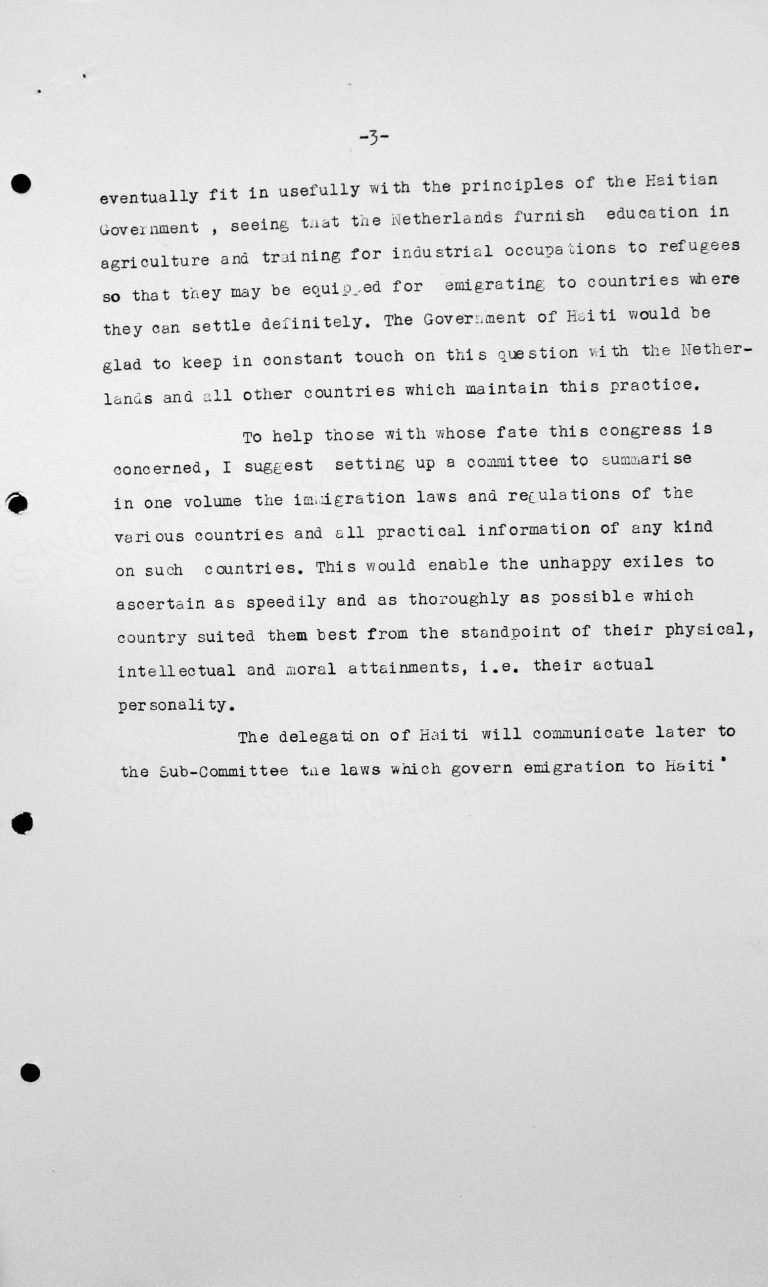
Speech by Léon R. Thébaud (Haiti) in the public session on July 11, 1938, 11am, p. 3/3
Franklin D. Roosevelt Library, Hyde Park, NY
Speech by Léon R. Thébaud (Haiti) in the public session on July 11, 1938, 11am, p. 3/3
Franklin D. Roosevelt Library, Hyde Park, NY
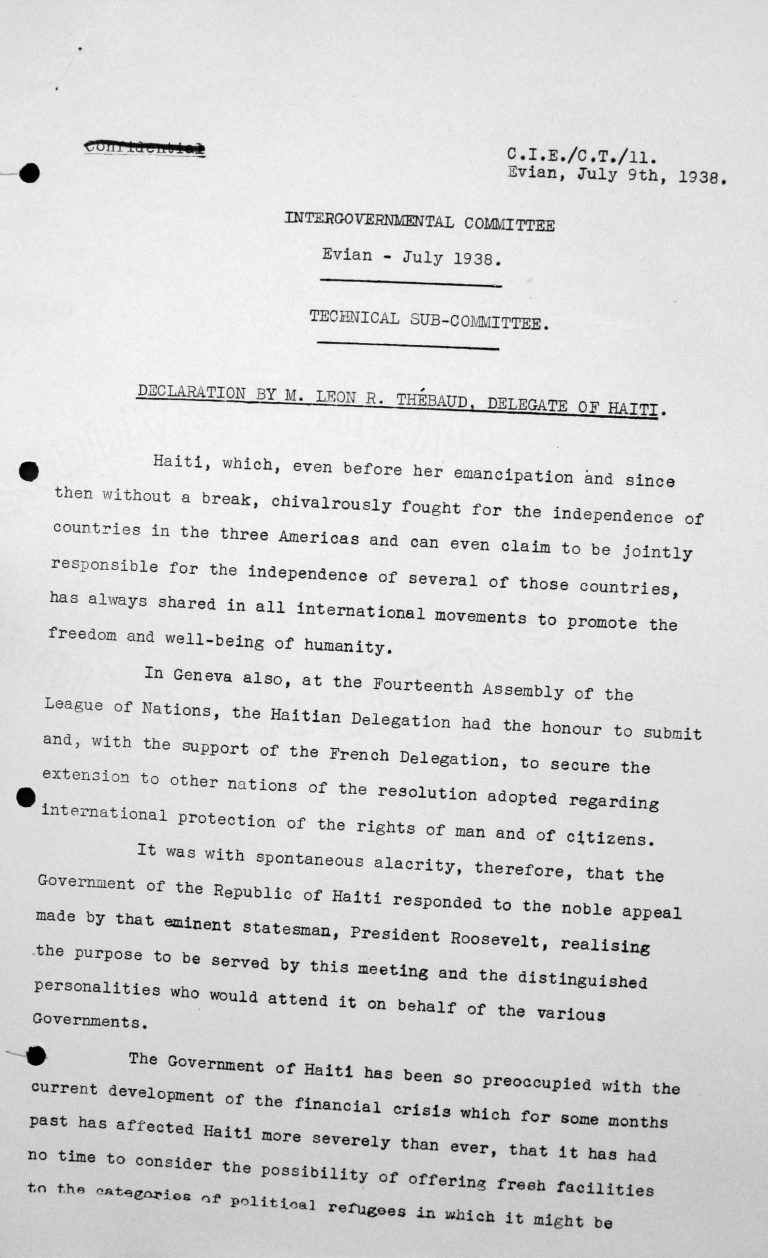
Declaration for the Technical Sub-Committee by Léon R. Thébaud, delegate of Haiti, July 9, 1938, p. 1/3
Franklin D. Roosevelt Library, Hyde Park, NY
Declaration for the Technical Sub-Committee by Léon R. Thébaud, delegate of Haiti, July 9, 1938, p. 1/3
Franklin D. Roosevelt Library, Hyde Park, NY
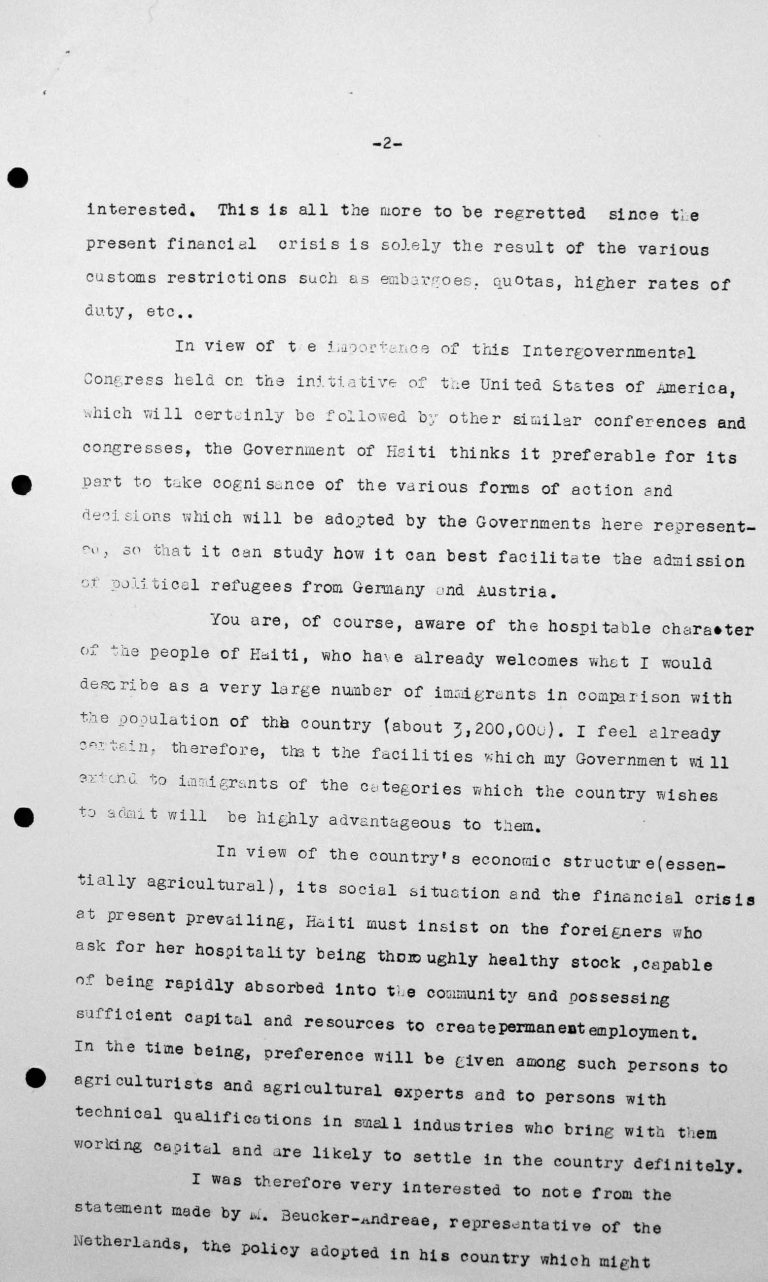
Declaration for the Technical Sub-Committee by Léon R. Thébaud, delegate of Haiti, July 9, 1938, p. 2/3
Franklin D. Roosevelt Library, Hyde Park, NY
Declaration for the Technical Sub-Committee by Léon R. Thébaud, delegate of Haiti, July 9, 1938, p. 2/3
Franklin D. Roosevelt Library, Hyde Park, NY
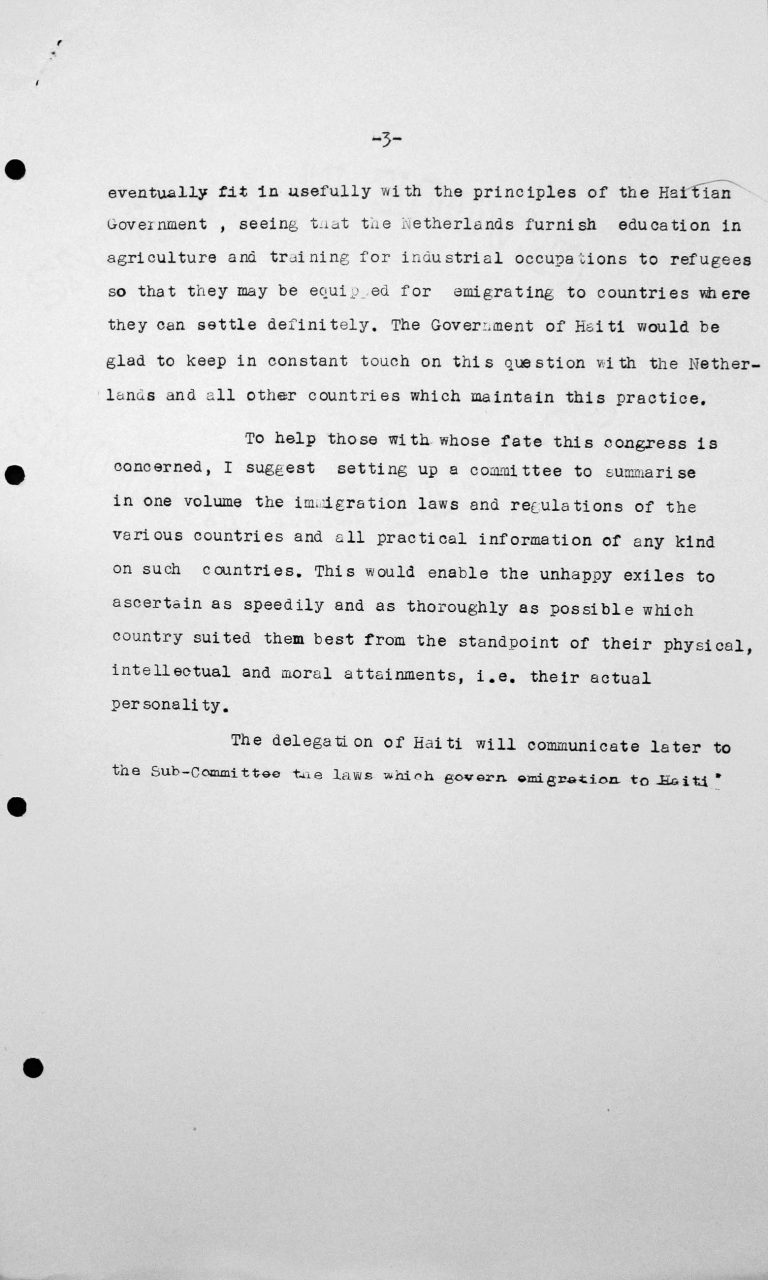
Declaration for the Technical Sub-Committee by Léon R. Thébaud, delegate of Haiti, July 9, 1938, p. 3/3
Franklin D. Roosevelt Library, Hyde Park, NY
Declaration for the Technical Sub-Committee by Léon R. Thébaud, delegate of Haiti, July 9, 1938, p. 3/3
Franklin D. Roosevelt Library, Hyde Park, NY
